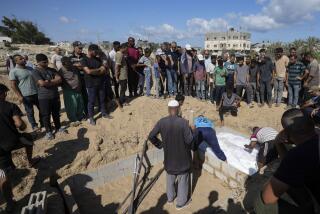Desecrating a Muslim cemetery with a Center for Human Dignity
- Share via
It is a leap in logic for the Rabbi Marvin Hier, dean and founder of the Simon Wiesenthal Center, to argue in his Feb. 13 Times Op-Ed article that because a parking lot has been built by Israel over part of the Mamilla Cemetery in Jerusalem, or that power and sewage lines have been placed underground, the Muslim cemetery ceases to exist.
The crux of the dilemma is a simple moral one: The Wiesenthal Center is seeking to build a Center for Human Dignity on top of a Muslim cemetery, a historic landmark and a place held sacred by many. Under the Wiesenthal Center’s supervision, more than 200 skeletons have been unearthed at the site.
The cemetery land, along with other property in the waqf (Islamic trust), was designated as “absentee property” when West Jerusalem came under Israel’s control after 1948. The land was ruled no longer sacrosanct in 1964 by the state-sanctioned Islamic Sharia Court in Jerusalem, whose members were appointed by Israel and largely distrusted by the Muslim population. In violation of international law, the land was then designated by Israel as public open space, and the municipality built a parking lot on it.
Hier’s claim that there has not been any opposition to the building of the parking lot ignores the fact that the government imposed martial law on Palestinians in Israel until 1966. Under this martial law, Israel ensured that any indications of national spirit or identity among Palestinians were quickly and forcefully crushed.
Despite this, Muslims in Israel did legally oppose the designation of waqf land as absentee property in the 1960s, lobbied to rebuild and maintain the Mamilla graves after the 1967 war, protested the desecration of the graves in the ‘70s and ‘80s, and today oppose the Center for Human Dignity’s construction on the cemetery land. One cannot blame Muslims in Israel because their protests fall on deaf ears.
Hier’s assertion that the “Israeli Supreme Court deliberated for almost three years before unanimously . . . authorizing the Wiesenthal Center to begin construction” must be understood in context. This is the same court that has long excused internationally condemned apartheid-like policies and human rights violations against Palestinians, including occupation, settlement construction and denying refugees the right to return. An organization like the Wiesenthal Center -- whose proclaimed mission is to protect the human rights and dignity of all people -- must certainly understand that the Israeli Supreme Court’s decision does not settle the moral issue. Building a Museum of Tolerance over the cemetery will only add to the existing pain and suffering of Palestinians and Israelis, further damage relations between Muslims and Jews worldwide and sow new feelings of animosity and division for generations to come.
Ironically, the same Wiesenthal Center that now plans to destroy Jerusalem’s historic Muslim cemetery previously spent nearly 15 years forcing the removal of a Roman Catholic convent from Auschwitz, which the organization’s associate dean said in 2005 is “the largest Jewish cemetery -- the single largest unmarked human graveyard -- in history,” and it “deserves universal respect.” Does the Wiesenthal Center believe that a different set of standards should apply to Jewish cemeteries versus non-Jewish ones?
Out of respect for human dignity, which is what this museum is supposed to honor, it would behoove the Wiesenthal Center to relocate the building to land that is not a burial ground. Doing so would not only save the center time and money, it would also keep the name of their Center for Human Dignity from becoming a mockery.
Hussam Ayloush is the greater Los Angeles area executive director for the Council on American-Islamic Relations.
More to Read
A cure for the common opinion
Get thought-provoking perspectives with our weekly newsletter.
You may occasionally receive promotional content from the Los Angeles Times.










